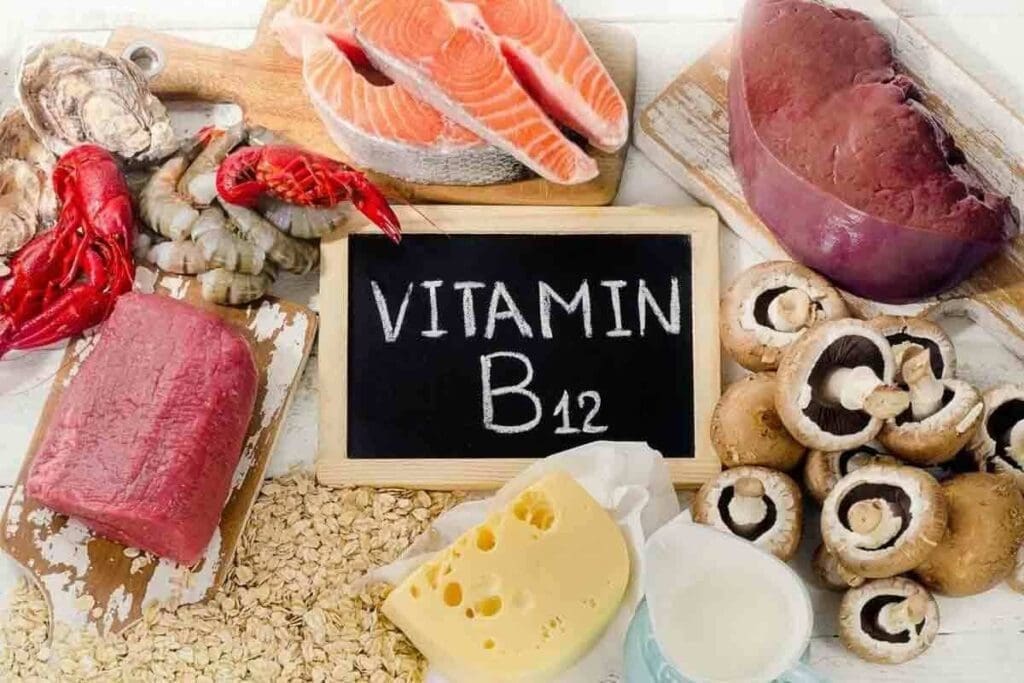Last Updated on November 17, 2025 by Ugurkan Demir

Vitamin B12 plays a vital role in maintaining healthy nerves, producing red blood cells, and supporting DNA synthesis. However, not all B12 supplements are the same. The two most common forms—methylcobalamin and cyanocobalamin—have distinct characteristics and benefits.
At LivHospital, we understand that choosing the right Vitamin B12 supplement is crucial. We guide our patients in selecting the most suitable form based on their specific health needs. Our global expertise ensures you receive the best possible advice for your well-being.
For those seeking B12 without cyanocobalamin, options like methylcobalamin and hydroxocobalamin provide effective alternatives. Understanding the differences between these forms helps you make informed choices for better long-term health.

Vitamin B12 is a key nutrient for our bodies. It helps with many functions. We’ll look at why it’s important and what happens if we don’t get enough.
Vitamin B12 is vital for making red blood cells, keeping nerves healthy, and creating DNA. It also helps break down fats and proteins, which gives us energy. The neurological health benefits of B12 are significant. It helps make myelin, the fatty layer around nerves.
We need Vitamin B12 to keep our nervous system working right and to make red blood cells. Without enough, we might feel tired, weak, and have nerve problems.
A lack of Vitamin B12 can cause fatigue, weakness, and nerve issues. Some common signs are:
| Signs of B12 Deficiency | Possible Consequences if Untreated |
| Fatigue and weakness | Impaired daily functioning |
| Neurological changes | Permanent nerve damage |
| Anemia | Inadequate oxygen delivery to tissues |
The signs of Vitamin B12 deficiency can start small but get worse if not treated. It’s important to catch these signs early to avoid serious health problems.

Vitamin B12 comes in many forms, each with its own role in our bodies. It’s not just one thing, but a group of similar compounds. Knowing about these forms helps us see their unique benefits and uses in health care.
Cyanocobalamin is a common Vitamin B12 form in supplements and fortified foods. It’s made in labs, not from natural sources. Yet, it works well to treat Vitamin B12 deficiency because our bodies can turn it into active forms.
“Cyanocobalamin has been used for years because it’s stable and affordable,” a study on Vitamin B12 supplements says. But, some people prefer other forms because cyanocobalamin is synthetic and contains cyanide, even if it’s safe by many standards.
Methylcobalamin is an active Vitamin B12 form in our bodies. It’s key for methylation, which helps with many body functions, like brain health and making neurotransmitters. Unlike other forms, methylcobalamin doesn’t need to be converted by the body.
Healthcare experts often suggest methylcobalamin for people with MTHFR mutations. Its direct use by the body makes it great for quick brain benefits.
Adenosylcobalamin, or cobamamide, is another active Vitamin B12 form. It’s important for breaking down fatty acids and amino acids in the mitochondria, where cells make energy. It keeps mitochondria working well.
Research shows adenosylcobalamin might help with energy and brain health. Its role in mitochondria shows how complex Vitamin B12 is in energy metabolism.
Hydroxocobalamin is a natural Vitamin B12 form found in some foods and supplements. It can be turned into active Vitamin B12 in the body. It stays in the body longer than cyanocobalamin, which might mean longer Vitamin B12 benefits.
Hydroxocobalamin is chosen by some for health reasons because of how it works in the body. Its longer stay in the body is good for those needing ongoing Vitamin B12 support.
Vitamin B12 forms come from different places. Some are made in labs, while others are found naturally. Knowing this helps us understand the different B12 supplements out there.
Cyanocobalamin is a synthetic Vitamin B12. It’s made by growing special bacteria in a lab. These bacteria produce the vitamin, which is then purified and turned into cyanocobalamin. This method makes cyanocobalamin cheap and easy to find.
The making of cyanocobalamin involves a few steps. First, bacteria are grown to make B12. Then, the B12 is taken out and cleaned up. This form is used in many supplements because it’s stable and affordable.
Other B12 forms, like methylcobalamin, are found in foods naturally. Methylcobalamin is in meat, fish, and dairy. These natural forms are easier for the body to use.
Foods with B12 are key for a healthy diet. They give us the B12 we need for our body’s functions. Knowing where to find B12 helps us eat better and choose supplements wisely.
When picking a B12 supplement, knowing the difference is important. Cyanocobalamin is cheap and stable, but natural forms like methylcobalamin are more direct and might be better for some health issues.
It’s important to know how Vitamin B12 forms are absorbed and kept in the body. The right form of B12 and how the body uses it are key to effective supplements.
The body breaks down Vitamin B12 in different ways. Methylcobalamin and adenosylcobalamin are used more easily than cyanocobalamin. Studies show that methylcobalamin stays in the body longer, giving a longer-lasting effect.
Getting Vitamin B12 into the body is a complex process. It involves the stomach, small intestine, and special proteins. Cyanocobalamin is often used because it’s stable and cheap. But, it needs to be changed into active forms, which can affect how well it works.
The way different B12 forms are kept in the body affects how often and how much you need to take. Studies show that methylcobalamin is kept in the body longer than cyanocobalamin. This means you might not need to take it as often.
| B12 Form | Retention Rate | Dosing Implications |
| Cyanocobalamin | Lower | May require more frequent dosing |
| Methylcobalamin | Higher | Potentially less frequent dosing needed |
| Adenosylcobalamin | Moderate to High | Effective for mitochondrial support |
Knowing these differences is key for health care providers and those looking to improve their B12 levels. By picking the right form and amount, you can meet your health needs better.
Vitamin B12’s conversion into usable forms is complex. It affects how well it works. Vitamin B12 comes in several forms, each needing different steps to be used by the body.
Cyanocobalamin, a man-made Vitamin B12, needs to turn into methylcobalamin and adenosylcobalamin to be useful. This change involves several steps:
This process can be slow for some, like those with genetic issues or liver problems.
Methylcobalamin, an active Vitamin B12 form, skips some of the conversion steps. Being already active, it’s ready for the body to use. This makes it a more efficient choice for supplements.
The main advantages of active forms like methylcobalamin are:
Knowing these differences helps pick the right Vitamin B12 supplement for your needs and health.
Vitamin B12 is key for our brain and nerves, but not all types are the same. The right B12 form is important for those looking to boost their brain health.
Methylcobalamin helps make myelin, a fatty layer that protects our nerves. This is vital for our nerves to work well and send signals. Methylcobalamin is great for our brain health because it directly helps make myelin.
Methylcobalamin also helps make neurotransmitters and keeps our nervous system healthy.
Studies have looked at how different B12 types help our brain and nerves. They often compare methylcobalamin and cyanocobalamin.
| B12 Form | Neurological Benefits | Key Features |
| Methylcobalamin | Directly involved in myelin synthesis, supports nerve function | Active form, readily available for use by the body |
| Cyanocobalamin | Converted to active forms in the body, supports overall B12 needs | Synthetic form, requires conversion to active forms |
| Adenosylcobalamin | Plays a role in energy production within neurons | Active form, involved in mitochondrial function |
The table shows how different B12 types help our brain and nerves. Methylcobalamin is special because it directly helps make myelin and supports nerve function. It’s a top pick for brain health.
When picking a B12 supplement for brain health, think about the type of B12. While cyanocobalamin is affordable, methylcobalamin and other active forms might be better for brain benefits.
Choosing a Vitamin B12 supplement without cyanocobalamin is key for some people. Those with MTHFR mutations, kidney disease, and the elderly might find better options. This is because their bodies process and absorb B12 differently.
People with MTHFR gene mutations struggle with methylation in their bodies. Methylcobalamin, an active form of Vitamin B12, helps them. It’s directly involved in methylation, which can help bypass metabolic issues.
Studies show that those with MTHFR mutations do better with methylcobalamin. This is because it’s already active, needing less processing by the body.
Kidney disease patients can’t easily convert cyanocobalamin into active forms. Adenosylcobalamin and methylcobalamin are better for them. They’re already active or easy to use.
These patients need to be careful with their vitamins and minerals. Using B12 forms that don’t need kidney conversion helps keep B12 levels right.
The elderly have trouble absorbing Vitamin B12 from food. This is called food-cobalamin malabsorption. Supplements with methylcobalamin or hydroxocobalamin work better for them. They’re absorbed more easily.
| Population | Recommended B12 Form | Rationale |
| MTHFR Mutations | Methylcobalamin | Directly involved in methylation, bypassing some metabolic issues |
| Kidney Disease | Adenosylcobalamin, Methylcobalamin | Active forms not dependent on renal conversion |
| Elderly | Methylcobalamin, Hydroxocobalamin | More readily absorbed due to decreased food-cobalamin malabsorption |
When picking a Vitamin B12 supplement, talk to a healthcare professional. They can help find the best form and amount for you.
Vitamin B12 supplements come in different forms, each with its own safety concerns. It’s important to know the safety profiles of these forms to make a good choice.
Cyanocobalamin, a common Vitamin B12 form, has a cyanide molecule. The body can handle small amounts of cyanide, but there are worries about long-term effects. The amount of cyanide in cyanocobalamin is generally considered safe, but some people might worry.
The cyanide in cyanocobalamin is small, and the body can process it. But, people with certain health issues or those sensitive to cyanide might prefer other Vitamin B12 forms.
Other Vitamin B12 forms, like methylcobalamin and hydroxocobalamin, don’t have cyanide. Methylcobalamin is known for its safety and is often seen as a safer choice than cyanocobalamin.
There aren’t many studies on the safety of different Vitamin B12 forms. But, what we do know is:
When looking at Vitamin B12 supplements, it’s key to think about your health needs and any sensitivities. Talking to a healthcare professional can help find the best Vitamin B12 form for you.
It’s important to understand the cost and stability of Vitamin B12 forms when choosing supplements. You need to look at the form of B12, its price, and how well it stays stable over time.
The shelf life of Vitamin B12 supplements changes based on the form. Cyanocobalamin is more stable and lasts longer than other forms like methylcobalamin. This means it needs less care in storage and is often cheaper to keep effective.
The price of Vitamin B12 supplements varies a lot. Cyanocobalamin is cheaper to make, which makes it more affordable for many. Methylcobalamin and other forms are pricier because they’re harder to make.
When deciding on value, think about both the cost and the benefits of each form. For some, the extra benefits of methylcobalamin might be worth the extra cost.
There are many forms of Vitamin B12 out there. Picking the right one for you needs some thought. Your health needs, like any medical conditions or genetic issues, play a big role.
When picking a Vitamin B12 supplement, think about your health, concerns, and what you like. For example, people with MTHFR mutations might do better with certain B12 types that their bodies can use better.
Health Status: Look at your health now and any medical issues. Some health problems need specific B12 types.
Health Concerns: Know what health issues you face, like brain problems or tiredness. These can be helped by different B12 types.
Personal Preferences: Think about what you prefer, like how you take it (oral, under the tongue, or by injection) and any food restrictions.
For different health issues, certain B12 types are better. Here’s a quick guide:
| Health Concern | Recommended B12 Form |
| Neurological Health | Methylcobalamin |
| MTHFR Mutation | Methylcobalamin or Hydroxocobalamin |
| Kidney Disease | Hydroxocobalamin |
| General Health | Cyanocobalamin or Methylcobalamin |
Talking to a healthcare expert is key to finding the right B12 for you. They can guide you through the choices and make sure you get the best supplement.
Understanding the different forms of Vitamin B12 helps you choose the right supplement. We’ve looked at cyanocobalamin, methylcobalamin, adenosylcobalamin, and hydroxocobalamin. This includes the key difference between cyanocobalamin and mecobalamin.
When picking a B12 supplement, think about its natural or synthetic origin, how well it’s absorbed, and its benefits for the brain. Our study found that while cyanocobalamin is widely used, methylcobalamin might be better for brain health.
To make a smart choice about B12 supplements, consider your health and needs. It’s wise to talk to a healthcare expert. They can help you find the best supplement for you.
Methylcobalamin and cyanocobalamin are two types of Vitamin B12. Methylcobalamin is naturally active in the body. Cyanocobalamin needs to be converted to become active.
Methylcobalamin is better absorbed by the body. This is true for people with certain genetic issues or poor absorption.
Cyanocobalamin is effective for many people. But, it might not be best for those with kidney disease or genetic issues.
Methylcobalamin supports neurological health directly. It’s better for people with specific health problems or genetic conditions.
Cyanocobalamin has a small amount of cyanide. This could be a problem for people with certain health issues or those needing high doses.
Think about your health, specific needs, and what you prefer. This will help you pick the right Vitamin B12 supplement.
Cobamamide, or adenosylcobalamin, is important for mitochondria. Methylcobalamin focuses on neurological health and methylation.
Yes, people with genetic issues, kidney disease, or who are elderly might do better with methylcobalamin.
Methylcobalamin is usually pricier than cyanocobalamin.
Supplements without cyanocobalamin are good for those sensitive to cyanide or with certain health issues. They offer better support for neurological health.
https://int.livhospital.com/wp-content/uploads/2025/10/image-2877-1024×683.jpeg
Subscribe to our e-newsletter to stay informed about the latest innovations in the world of health and exclusive offers!